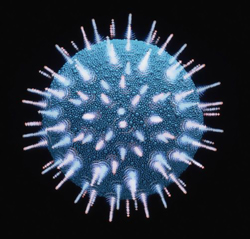HIV Gene Therapy

Human immunodeficiency virus (HIV) is the virus that causes AIDS. According to the latest WHO Aids Epidemic Report (Dec. 2005, you can download it here) the number of people living with HIV is 40.3 million. This includes 2.5 million children under the age of 15. Last year alone 3.1 million people died from AIDS. And since it was first recognized in 1981, AIDS has killed more than 25 million people. This makes AIDS “one of the most destructive epidemics in human history”.
This story from the BBC News reports that the preliminary tests of an HIV gene therapy are encouraging. The Penn Medicine Press release is available here. Below is an excerpt from the BBC report:
Researchers at Pennsylvania University treated five patients, who had not responded to drugs, with disabled HIV. It carried added genetic material that blocks HIV reproduction and as a result HIV levels in the patients' blood either stabilised or decreased. The research raises the prospect that gene therapy might provide an alternative to antiretroviral drugs.
The long-term effectiveness of the drugs is under threat from the growing problem of drug resistance. Researcher Dr Carl June said: "Gene therapy has long been discussed as an alternative treatment for HIV. The goal of this trial was safety and feasibility and the results established that. But the results also hint at something much more.
…They [the patients] were given a single infusion of their own immune system T cells that had been removed from their blood, purified and genetically modified to carry the manipulated version of HIV. Each patient received around 10 billion T cells - between 2% and 10% of the total number in an average person.
The disabled HIV gene used by the researchers was modified to carry an antisense RNA molecule, which scrambles the process of reading genetic information and is designed to sabotage the process HIV uses to reproduce itself inside infected cells.
…Dr Bruce Levine, who also worked on the study - published online in Proceedings of the National Academy of Science - said: "Just because this has produced encouraging results in one or two patients doesn't mean it will work for everyone. We have much more work to do."
Dr George Schmid, a specialist in HIV at the World Health Organization, said it could take many years to determine whether the technique was safe and effective, but he said the results were "encouraging".
Cheers,
Colin


<< Home